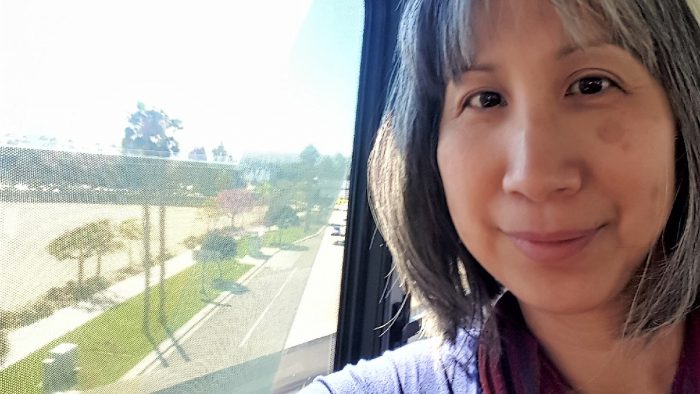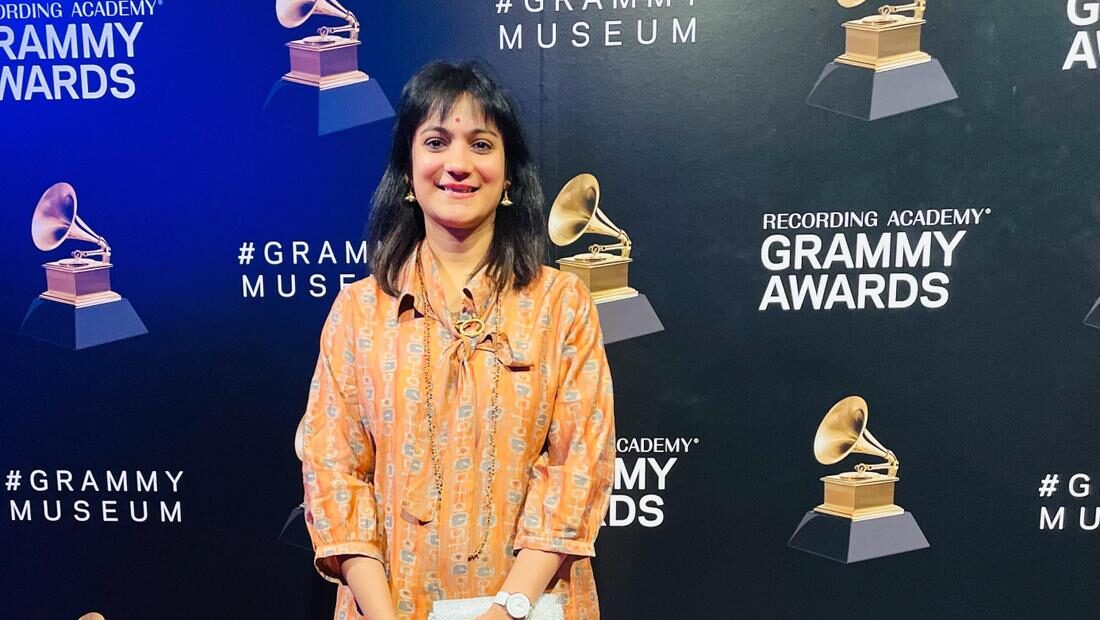Dr Shin Shin Tang is a Licensed Clinical Psychologist at the Oregon Mind Body Institute at Eugene Oregon. In her practice, she has worked with a wide variety of concerns including depression, anxiety, relationships, and grief. She says Vedanta teachings have helped her “foster the strength of the therapeutic relationship as well as help clients see themselves as whole people, bigger than the mental and emotional challenges they face”.
Dr Tang says Vedanta permeates her life through little things like chanting a mantra at waking and before eating, meditating, performing a puja once a week at a local shrine and also through her yoga practice. Influenced by the teachings of Swami Dayananda and Swamini Swatmavidyananda, and their teachings on the Vedas and other sacred texts from Indian sages, Vedanta permeates her work as a therapist.
While the West is constantly talking about a Mind- Body connection, Dr Tang says Ayurveda sees no distinction between the two. In her own words:
“Regarding the mind-body connection, to paraphrase an Ayurvedic doctor I have met - there is not really talk of a mind-body connection in Ayurveda because mind and body are seen as the same thing. There is no need for the idea of a 'connection.' (I recognize the irony that I co-direct a ‘mind-body’ non-profit, but this is where Western culture is at.)
Similarly, in a broad sense, Vedanta teaches that the entire body-mind-sense complex is mithya, an ‘as though’ limited reality. This is what the mind-body have in common. At the same time, mithya reality cannot be completely negated as unreal since it is a manifestation of Ishvara who limitless. So the entire mind-body-sense complex is also Ishvara.
On a more specific level, the Vedic teachings do acknowledge the importance of cultivating a clear mind in preparation for the knowledge. (However, Swamini Svatmavidyananda ji is careful to specify that while the knowledge takes place in the mind, it is not of the mind.) A necessary component of preparation means taking care of the body through self-care and diet. Using the body in sattvic ways such as performing rituals, meditating or not causing harm to other beings is also taught. Having a sattvic lifestyle helps clear the mind. The mind cannot be at ease otherwise. In these modern times, we also have the gift of psychotherapy, which increases self-love. Then one can be ready for the ‘supertherapy’ of Vedanta as Swaminiji calls it.
On how Vedanta affects my practice - it frankly keeps me sane! Without Vedanta, I don't know how I could function in relationships with family, friends, or my patients. I'll try to explain the mechanisms a bit.
There are many, many approaches to psychotherapy. However, the research is becoming clear that the one common factor in facilitating change in people is the quality of the therapeutic relationship. That is, how much the client feels understood, cared for, and trusts the therapist. Whatever other techniques one uses in therapy seem to be interchangeable. Vedanta teachings help me foster the strength of the therapeutic relationship as well as help clients see themselves as whole people, bigger than the mental and emotional challenges they face.
Swaminiji says one can simultaneously love the person and not like the behaviour. In other words, one can see the behaviour and emotions as mithya and the person as Ishvara. This ability to discriminate between conditional reality (mithya) and unconditional reality (Ishvara) is called viveka. As a therapist, it helps me:
1. Love my clients more freely - to quote Swaminiji, viveka is the source of compassion. So beautiful, yes?
2. Help my clients see themselves more clearly - that they are not identified by this mess of depression, anxiety, hurt feelings, etc.
3. Have healthy boundaries with my clients - I strive to serve them as best as I can, but in the end, they have free will given by Ishvara and I do not have control over that. Viveka also teaches me not to identify with what is not me.
It is a paradox that the teaching of oneness helps me have healthy boundaries but I think it works in this way: my practicing seeing myself as none other than the whole helps me recognize that all else is not real. Then, I can let go of identifying with others as myself or depending on them to make me feel good and worthwhile. In one meditation Swaminiji teaches, we imagine there is an inside and outside of ourselves - the inside being Ishvara and the outside everyone and everything else. Of course, this is a yet another duality, but it helps with letting go of mithya?”
Dr Tang’s says she must have always been longing for the teachings from a very young age and they came unbidden.
“I think I have always been longing for the teachings of Advaita Vedanta and Hinduism but for a long time was not consciously aware of this desire. Despite this ignorance, somehow the teachings found me rather than me finding them. However, I suppose there was a journey of preparation. My first exposure to Hindu philosophy was Alan Watt's The Book, a Westerner's interpretation of Vedanta, which I ‘happened’ to pick up at a bookstore in college.
"Discovering yoga years later in my late 20s gradually fuelled an interest in Sanskrit until I realized I needed a spiritual teacher. I actually first tried Buddhism, but while I did find great peace in meditation, I still felt something was missing (which I now know was Brahman) and had not found the right teacher. I spent several years participating in a community dedicated to Amma (the Hugging Saint) and going to her tours. This was my first exposure to Hindu rituals and teachings. Like yoga, these experiences fuelled a greater desire to be taught, but at the same time, I was not finding the teaching I desired in this community. Still, I thought I had found my guru in Amma."
That was when Dr Tang had an epiphany of sorts. A beautiful icon of Goddess Mukambika arrived in Eugene, Oregon in 2008 via Swamini Swatmavidyananda.
“I was strongly drawn to this Devi shrine and simply wanted to worship her, but, as Swaminiji jokes, one cannot have the Devi without the teacher whether one likes it or not! I met Swaminiji in the shrine itself and have been her student since. She had such a clarity about her that cut through all my misery and longing. I feel as though Swaminiji heard my prayers and found me rather than me finding her. She has been my primary gateway to Hinduism, teaching me how to conduct pujas and chant mantras, participate in homas, and, of course, study Vedanta.”
Dr Tang says that as a young child between 4 and 6, she remembers understanding that “time was not absolute and that the ego did not matter.” “Growing up, I lost touch with this knowledge, but the memory of this clarity is what keeps me returning to Vedanta and Swaminiji over and over again. The teachings are restoring my memory of who I am,” says the therapist who is drawn towards Advaita Vedanta and the concept of moksha.





